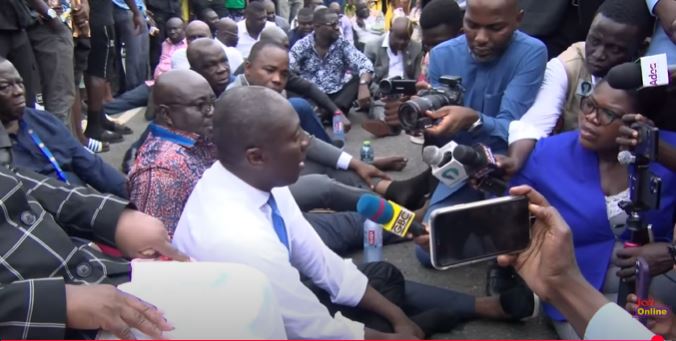When lawmakers themselves appear unwilling to abide by the laws they legislate – Nsemkeka
Justice, equality, and fairness are the cornerstones of any functional democracy. A just society requires that all individuals be treated equally, regardless of their social, economic, or political standing.
The proverb “People who live in glass houses shouldn’t throw stones” is a variant of the phrase “You don’t try throwing stones when you want to enter the house,” as stated by lawyer Andy Appiah-Kubi. According to this adage, someone who is weak or flawed shouldn’t criticise others, as doing so can expose their own shortcomings.
The arrest and subsequent protest surrounding Bernard Antwi Boasiako, popularly known as Chairman Wontumi—the Ashanti Regional Chairman of the ruling New Patriotic Party (NPP)—have sparked significant discourse on accountability, the rule of law, and the political climate in Ghana. The protests, led by members of the Minority Caucus in Parliament, raise important questions about political solidarity, the integrity of state institutions, and the implications of political influence on judicial processes.
Wontumi has been accused of various financial irregularities, including fraud, causing financial loss to the state, and money laundering. The investigations are reportedly linked to a larger international organised crime scheme, which complicates the matter further and underscores the gravity of the allegations against him. Under Ghanaian law, individuals accused of serious crimes must be held accountable, especially when the stakes involve public trust and the potential misuse of state resources.
The principle of accountability is paramount in any democracy. It mandates that individuals—particularly those in positions of power—are answerable for their actions and decisions. In this context, one must ask: should the leaders of a political party rally behind an individual merely because he represents their party, regardless of the seriousness of the allegations levelled against him? Public trust depends on the willingness of political actors to allow due process to unfold without undue interference.
The protest staged by the Minority MPs in support of Wontumi presents a fascinating yet troubling aspect of Ghanaian politics. On one hand, it showcases political solidarity within a party framework. On the other, it raises concerns that some legislators do not regard the sanctity of legal processes that underpin the rule of law. In a functioning democracy, lawmakers should prioritise the legal structures and norms designed to ensure justice—especially when a fellow party member is facing serious allegations.
Protests can serve as an essential tool for nonviolent expression and advocacy for change. However, when political actors leverage protests to challenge the integrity of the legal system, it sets a dangerous precedent. Are they drawing attention to a potential miscarriage of justice, or are they attempting to exert political pressure to manipulate outcomes for a party ally?
The act of protesting in support of Wontumi does not merely reflect on him; it reflects on the broader political environment in which accountability often becomes a casualty of partisanship. Political supporters must recognise that they can advocate for their members without compromising the principles of justice and accountability. Otherwise, they risk fostering an environment where political allegiance takes precedence over legal obligations.
Beyond the protest itself, the legal context surrounding public demonstrations in Ghana—particularly the Public Order Act—raises a critical discussion about adherence to laws designed to maintain public order. Section 491(1) of this Act stipulates that any individual or organisation intending to hold a special event in a public place shall notify the police at least five days prior to the event, to minimise disruptions to daily life.
In the case of these protests, there are legitimate concerns regarding the adherence to this law by Members of Parliament. A public servant’s obligation is not solely to advocate for their constituents but also to abide by the laws of the land. Their actions during the protest illustrated a paradox: they demanded accountability for a party member while simultaneously disregarding the legal protocols meant to govern public demonstrations.
This contradiction reflects a broader narrative within Ghana’s political landscape: the perception that political affiliation grants immunity. This could lead to an erosion of public trust, as ordinary citizens may perceive that political elites are above accountability to both their constituencies and the law. It illustrates a dangerous notion—that one can act without regard for consequences simply because of political connections.
Moreover, this situation serves as a crucial reminder to the Ghanaian populace about the need for continuous engagement with, and scrutiny of, their political representatives. Citizens should advocate for accountability and demand from their leaders a full commitment to transparency in governance.
The unfolding story surrounding Wontumi’s detention and the subsequent protests highlights profound issues within the Ghanaian political landscape. Upholding the rule of law should never be subordinate to political allegiance or influence; rather, every citizen—especially those in leadership—must respect it.
The protest highlights the need for greater accountability and transparency in Ghana’s political system, as allegations of financial irregularities against Chairman Wontumi are serious and should be thoroughly investigated. The protest may be seen as political grandstanding, with the focus on scoring political points rather than promoting accountability.
Kudos to lawyer Andy Appiah-Kubi for handling the Wontumi case with maturity. Unlike some others who seem to politicise every issue, he is allowing the legal process to unfold. Due to politics, it is pitiful to hear so many lawyers claim that the fifty-million-Ghana-cedi bail requirement was unfair. They made such statements without knowing the specifics or particulars of the offence. If people believe the investigation or bail conditions are unfair, the court is the right place to contest it. While law enforcement isn’t obligated to disclose details, providing information about Wontumi’s arrest could enhance transparency and credibility.
Ghanaians are eager to see all duty bearers held accountable. No one is above the law. Let’s allow the law to take its course.

